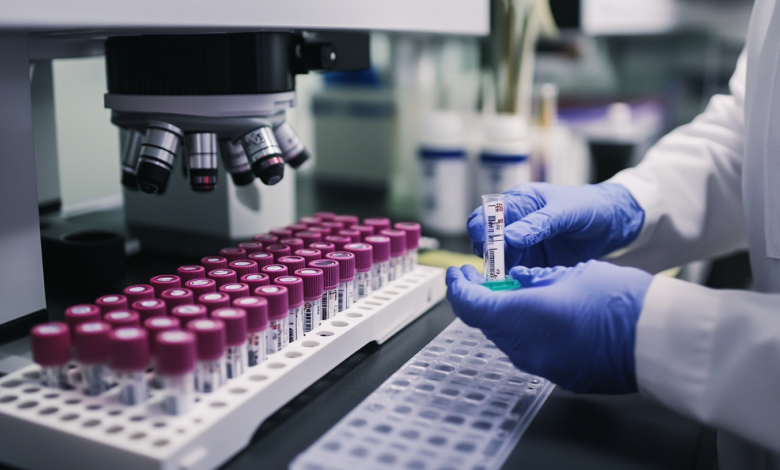
In recent years, personalized nutrition based on DNA testing has become a groundbreaking approach to health and wellness. Unlike conventional diets that take a one-size-fits-all approach, personalized nutrition tailors recommendations based on an individual’s genetic makeup, offering a roadmap to better health, improved energy, and enhanced athletic performance. This customized way of eating considers genetic predispositions, helping you make food choices that align with your unique biology.
In this guide, we’ll explore the benefits of eating for your genes, how DNA testing can shape your diet, and why personalized nutrition is a game-changer for optimal health and fitness.
1. What is DNA-Based Nutrition?
DNA-based nutrition is a scientific approach that uses genetic information to develop personalized dietary recommendations. Through DNA testing, scientists can analyze specific genes linked to metabolism, nutrient absorption, and food sensitivities. This information provides insights into how your body reacts to different foods, enabling you to make informed dietary choices that align with your genetic profile.
The concept behind DNA-based nutrition is simple: your genes play a significant role in how your body processes various nutrients. For example, some people may have a genetic variation that makes them less efficient at metabolizing caffeine, while others may have genes that influence how they process carbohydrates or fats. By understanding these genetic factors, you can create a diet plan tailored to your body’s unique needs.
2. How DNA Testing for Nutrition Works
DNA testing for personalized nutrition begins with a simple cheek swab or saliva sample. This sample is then analyzed in a laboratory to identify specific gene variants associated with nutrient metabolism, food sensitivities, and even fitness potential. Many reputable companies offer DNA-based nutrition testing, and the process usually takes a few weeks, after which you receive a report outlining your genetic predispositions related to diet and nutrition.
Some of the common areas that DNA testing covers include:
- Macronutrient Processing: How your body handles carbohydrates, proteins, and fats.
- Vitamins and Minerals: Genetic predispositions to deficiencies in key nutrients like vitamin D, B12, and iron.
- Food Sensitivities and Intolerances: Sensitivities to gluten, lactose, and other common food components.
- Weight Management and Metabolism: Genetic factors affecting weight gain, fat storage, and metabolic rate.
Armed with this information, you can make dietary choices that optimize nutrient intake and avoid foods that may lead to discomfort or adverse reactions.
3. Benefits of Personalized Nutrition
Personalized nutrition offers numerous advantages, from improving your overall well-being to helping you achieve specific health and fitness goals. Here are some of the key benefits:
- Enhanced Energy and Performance: By eating foods that are well-suited to your genetic profile, you can fuel your body more effectively, boosting your energy levels and mental clarity. For athletes, this approach can enhance performance, stamina, and recovery.
- Better Weight Management: DNA-based nutrition can reveal insights about your metabolism and how your body stores fat, enabling you to create a weight management plan tailored to your needs. By focusing on foods that work with your body’s unique chemistry, you can manage your weight more effectively and sustainably.
- Reduced Risk of Chronic Diseases: Some genetic markers are linked to chronic conditions like heart disease, diabetes, and obesity. By adopting a diet that aligns with your genetic risk factors, you can proactively work to reduce these risks.
- Improved Digestive Health: DNA testing can reveal sensitivities or intolerances to foods like lactose or gluten, which can cause digestive discomfort. With this knowledge, you can avoid foods that irritate your system, improving your digestive health and overall comfort.
- Optimal Nutrient Absorption: Personalized nutrition helps identify specific vitamins and minerals your body may struggle to absorb, allowing you to prioritize foods or supplements to meet these needs.
4. Eating for Your Genes: Key Considerations
Once you receive your DNA test results, you’ll get personalized recommendations on how to structure your diet. Here are some typical recommendations based on genetic predispositions:
- Carbohydrate Sensitivity: Some people have a higher sensitivity to carbs due to genetic factors that affect insulin response. If you’re one of them, a low-carb or moderate-carb diet might be recommended to manage blood sugar levels effectively.
- Fat Metabolism: Certain genes affect how well you process fats. People with variations in these genes might be advised to adopt a low-fat diet or focus on healthy fats, like omega-3s from fish and nuts.
- Protein Requirements: Genetics can also influence your body’s protein needs. Some people have a genetic profile that requires higher protein intake for muscle growth and repair, which can be beneficial for athletes and those engaged in regular exercise.
- Micronutrient Needs: DNA testing can reveal predispositions to deficiencies in specific vitamins and minerals. If your results show a tendency toward low vitamin D, B12, or iron levels, incorporating foods rich in these nutrients or taking supplements can help prevent deficiencies.
- Sensitivity to Caffeine and Alcohol: Your genes can determine how your body metabolizes substances like caffeine and alcohol. If you’re genetically predisposed to be a slow caffeine metabolizer, you may experience jitteriness or insomnia from regular coffee consumption. In this case, reducing caffeine intake or switching to decaf could be beneficial.
5. Personalized Nutrition for Athletes and Fitness Enthusiasts
Athletes and fitness enthusiasts can especially benefit from DNA-based nutrition as it helps optimize performance and recovery. Understanding your unique nutritional needs can enable you to tailor your diet to fuel your workouts, improve endurance, and accelerate muscle recovery.
For example, some people have a higher need for antioxidants, which help reduce inflammation and promote muscle repair after intense workouts. Based on DNA results, athletes can prioritize antioxidant-rich foods like berries, nuts, and leafy greens. By working with the Best Sports Nutritionist in India, you can develop a genetic-based meal plan that complements your training routine and supports peak performance.
6. How to Start with DNA-Based Personalized Nutrition
If you’re interested in DNA-based nutrition, start by selecting a reputable DNA testing service that specializes in personalized nutrition. Many companies offer comprehensive reports with actionable insights, and some even provide guidance on how to implement these dietary changes. You can also consult with a nutritionist who specializes in genetic-based dietary planning to help interpret your results and develop a plan aligned with your goals.
Once you have your report, focus on incorporating the recommended changes gradually. Making small adjustments over time is often more sustainable than overhauling your entire diet overnight. Remember, personalized nutrition is a journey that evolves as you learn more about your body’s unique needs.
Conclusion
Eating for your genes is a revolutionary approach to nutrition that allows you to align your diet with your unique genetic profile. By leveraging DNA testing, you can uncover valuable insights about how your body processes nutrients, identify food sensitivities, and create a diet that supports your health, fitness, and wellness goals. Whether you’re seeking better weight management, increased energy, or enhanced athletic performance, DNA-based nutrition offers a tailored approach that can help you make the most of your meals.
For those serious about using DNA-based insights to maximize their fitness and health outcomes, consulting with the Best Sports Nutritionist in India can provide expert guidance on developing a plan based on genetic testing results. Embracing personalized nutrition is a powerful step toward a healthier, more vibrant life, empowering you to eat smarter and live better by understanding your unique genetic needs.


